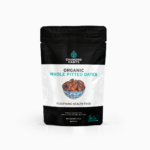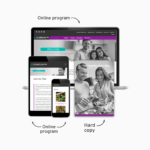As a society we have become obsessed with how we look – it’s all about what we weigh and our quest to be slim. But what about our health? Is our low fat, no fat, no sugar, processed way of eating act ually good for us or are we doing our bodies more harm than good?

Weight loss, weight gain, diets, meal replacements, more diets, exercise, fatty food, good food, fast food, carbohydrates, fad diets … weight – we obsess about it, we lie about it and we dream about having less of it. So why does what we weigh, weigh so heavily on our minds (excuse the pun)? And if you’re a celebrity – watch out! You’re fair game when it comes to the judgmental masses. Put on a few kilos over Christmas and your recently and only slightly expanded derrière will be plastered all over the front cover of every trash magazine on the planet before you can say “one super supreme with the lot please”. If you’re a skinny celebrity, we aspire to look just like you. So why are we so obsessed with weight? It’s not like we are obliged to share our magic number with the world. I certainly don’t feel the need to introduce myself with, “Hello, my name is Alli, I’m a writer and I weigh BLAH ”. See – I refuse to even share my weight with you!
To be honest, after having a baby I have decided not to obsess about what I weigh. I have a vague idea, but it has been about three months since I last tip-toed onto my bathroom scales. It was doing my head in! I now obsess about other things, like whether I will fit into my old jeans again sometime before 2020. And don’t even start me on the pressure to get that pre-baby body back!
What is most frightening is that, while we have become obsessed with our weight, we could be neglecting our health. The focus is on what we weigh or the size of our jeans, not on what we put into our bodies. Low fat, no fat, sugar-free – we are now preoccupied with the nutritional panel on food products. Shouldn’t we be more concerned about the quality of the food we eat? That said, yes we should all aim to be in a healthy weight range for our height and age, but does our health have to suffer in the process?
With the New Year upon us, most of us have committed to the universal resolution of “losing weight and getting fit”. Gym owners are rubbing their little hands with glee, all the way to the bank. So with our resolutions firmly in place, this year I challenge you to add one more to your list – to eat well and to learn more about your body and the food you put into it. I’ve already started my education, thanks to local nutritionist, author, public speaker and bundle of endless energy, Cyndi O’Meara.
Cyndi is energy personified. In fact, I’m not sure I have met anyone with so much of the stuff – it almost oozes out of her ears! She is fit, healthy and knowledgeable about all things food-related. Surely she’ll have the secret to inner health and harmony and, dare I say it, weight loss (I just want to fit my old jeans again!)
Very quickly I realise Cyndi is far from your average nutritionist. In fact, her approach could be described as unorthodox.
Before launching into her teachings, it’s important to understand her upbringing and education as both have played a major role in sculpting the woman who sits before me. A self confessed “Mexican”, Cyndi hails from Wangaratta in Victoria. Upon finishing school, she was confused about what career path to follow, but she knew she wanted to snow ski – skiing is still one of her passions.
“A friend suggested I could study and ski if I went to uni in Colorado,” she recalls. “I enrolled in pre med (medicine) and met some amazing teachers – people who changed the course of my life.” While Cyndi knew she loved food, she learnt a lot more about the evolution of what we eat, while studying anthropology. “I realised that what we were eating every day was actually the result of evolution. The foods we used to eat are certainly not the foods we eat today.”
Inspired to take on a career in nutrition, she returned home and enrolled in a degree in nutrition at Deakin University, although she soon became confused by what she was being taught. “I didn’t agree with what they were teaching us. We were taught that things like margarine were good for you. It was ridiculous,” she recalls, her passion for healthy foods shining through. Thinking there was no way she could practise as a dietitian, Cyndi went back to university to study chiropractic. “After two years I realised I could actually teach what I wanted. I could create my own philosophies, and I did.”
She attributes her knowledge to what she has learnt from her mum and dad, her degree in nutrition and her studies in chiropractic. Cyndi’s father is a qualified pharmacist who trained to become a chiropractor, like her mother – their way of life formed the backbone of her teachings. Her dad lived by a ‘vitalism’ philosophy based around the idea that you are born perfect – you just need the right resources around you and no interference. His focus was on our health, food and diet, not western medicine.
To this day, Cyndi hasn’t ever taken a pill – not an aspirin or an antibiotic. She tells me the average person will consume 14,000 prescribed and 40,000 over-the-counter drugs in their lifetime. Terrifying!
“Two years ago I had one of my ‘Aha!’ moments when I realised I have actually been teaching vitalism nutrition. Food really is perfect as long as we don’t interfere with it and we give it the right resources. That’s how it should stay.” Cyndi opened her own practice and began consulting, but sold the business when she had her son. Together with her husband Howard, she moved to the Sunshine Coast 20 years ago and approached The Sunshine Coast Daily about the idea of running a column.
“My column was very controversial. We had lots of letters to the editor. I wrote one about the dangers of margarine and the Margarine Association threatened to sue the newspaper unless they printed a retraction. I also wrote about the dangers of artificial sweeteners. Then a new editor came onboard and he was worried … I couldn’t write the truth so I gave up.”
Cyndi is relieved to have been vindicated on the margarine and artificial sweetener front – both products are now known to be far from good for us. “In 1996 I realised there really was a book in what I had written. I sent them (her columns) to a few publishers but didn’t have any success, until I met with a local editor who told me I needed to inject more of me in my writing.
I invested in a ghost writer and co-editor and Changing Habits, Changing Lives was written.” Cyndi decided to self-publish, selling 20,000 copies before being picked up by Penguin. More than 90,000 copies of the book have been sold since 1998. Towards the end of a two year trip around Australia, Penguin approached Cyndi to write her second book – a cook book. From here, Cyndi’s business flourished. In addition to her two books, she has a thriving public speaking business and does about 80 presentations a year.
Her online business is also a constant source of inspiration and income (www.changinghabits.com.au) – you can even join in on one of her teleseminars – plus she has four more “resources” on the way. Now to the meaty stuff … her beliefs and teachings. You’d better hold on to your hats, ladies and gentlemen. I’m about to challenge everything you think you know about food.
If we take a step back in time, some 30 years ago, food was healthy and wholesome – we didn’t interfere with it, we just ate it and it was good for us. Food wasn’t processed to within an inch of its life, and we were a healthier people for it.
“Everything was fine 30 years ago, until the scientists got involved. What was fresh and wholesome was suddenly lost. Food scientists decided they could make our food better, healthier and tastier. They thought they could improve on nature. All of a sudden our food was coming out of laboratories – that makes no sense,” Cyndi passionately explains, adding that food scientists are “megalomaniacs” and that yes, she is “clearly narky” about what has transpired over the years.
She goes on to explain that scientists decided to take what they perceived was “bad” out of our foods – salt, sugar and fat. More often than not, these elements are replaced with synthetic additives, and this is where the majority of our problems lie.
“Forty-one percent of kids are sick, and autism is on the rise – 25 years ago, one in 145,000 children had autism. Today it’s one in 100. The incidence of allergies has increased tenfold in 10 years. One in three children has asthma. Obesity, heart disease, cancer … it’s all on the rise. Diabetes is up 300 percent on 20 years ago.”
This is where I have my own ‘Aha’ moment. She’s completely right. As soon as science started messing with our food, the rate of illness, disease and obesity increased. I am flabbergasted at the thought and a little embarrassed that I hadn’t caught onto this sooner.“When we used to eat the foods that society perceives as bad for us, like butter and meat and sugar and natural fats, we were so much healthier. We are now obsessed with diet foods and low fat and adding things like folic acid to our food …”
Let’s talk additives. “We consume about seven and a half kilograms of additives each and every year. Imagine how much of that is left on as added weight? If we just went back to basics we wouldn’t have all these problems.” Cyndi walks me through a presentation she gives to school students, highlighting the ingredients in an average chicken nugget (with the Smart Choices tick, no less). There are numerous non-food items and synthetic additives, which is frightening enough. She then clicks onto the next slide – the list of ingredients behind the list of ingredients. It’s long – bloody long – it takes up an entire powerpoint slide! “This is what we are really putting in our mouths. No wonder we are sick, obese and depressed.”
No wonder indeed. There has to be a Michael Moore documentary in here somewhere! Cyndi describes it as a “cloak and dagger industry” and I can see why. So why are we encouraged to obsess over the nutritional panel on food products when we really should be looking at the ingredients?
“We have an unhealthy obsession with healthy eating called Orthorexa Nervosa – it’s an official disease,” Cyndi informs me. “We have been taught to look at the nutritional content and not the ingredients.” This is one of the main reasons Cyndi rejected so much of what she was taught at university.
What Cyndi is saying makes complete sense, so how can an entire industry disagree with her seemingly simple approach to eating? “It’s all about money – there’s really no money in my way of eating. So much of the research is funded by big business with a vested interest in the results. I’m always wary of research and who funds it,” she explains. “We can both prove our points using science and research, but when everyone is doing and saying the same thing it’s hard to stop it. You have to want to make the change yourself.” Understandably, Cyndi has encountered a great deal of negativity over the years – this is bound to happen when you’re speaking out against a norm that society has accepted. “Twenty years ago, people used to abuse me and walk out of my talks when I told them that butter was better for them than margarine … it’s different these days. People don’t walk out – instead I see their jaws dropping as they have their own ‘Aha’ moment.” So is she a radical? “I’m not new age in my thinking, in fact it’s all very old-fashioned. It’s about culture and tradition and going back to basics.”
How can someone change their life so dramatically? I think about my pantry and fridge – I considered our family to be reasonably healthy, but now I realise that almost everything I am putting in my mouth is bad for me in some way. I want to rectify this, but we’re not talking small change. We’re talking total overhaul. Everything would have to go! But I don’t have the time or money to start again and make everything from scratch. They had the time 30 years ago, but the world is a different place today. I can’t sit at home all day making jams and mayonnaise. Cyndi acknowledges that it can be time consuming to live this way, but she has a “magic bullet” – a machine that makes healthy eating a breeze. It’s the Thermomix, and while I’m hesitant to turn this story into an infomercial for a new kitchen gadget, it would be a crime not to.
This thing does everything, and I mean everything. Cyndi, who is a spokesperson for the company, takes me through a quick tour of her fridge and shows me everything she has made with the help of her kitchen buddy over the last 24 hours. Fresh juice (with the fibre), jam, stewed apricots, pesto, hollandaise sauce and rice. But wait, there’s more! It can make ice-cream, sorbet, slow cooked casseroles, butter, risottos, bread dough, baby food … the list is endless. Add sugar, eggs and milk, press three buttons and presto … homemade custard! Cyndi agrees that it is easier to live this way with the Thermomix, but changes can be made without it. She recommends reading her book and starting with breakfast only – one step at a time is fine. “Breakfast is just as important as dinner. Cereals are so bad for you – they are all so refined so there’s no nutrition left. The marketing that goes into selling breakfast cereal is horrific. There are so many alternatives that are really good for you. I make French toast or blueberry muffins or have a fresh juice. There’s so much fibre and goodness in a juice it can last me til 2pm.”
Having had a sneaky peak in her fridge, I ask Cyndi if I can nosey around her pantry too. I am dying to see what my pantry should look like. I am pleasantly surprised to see quite a few canned goods – what Cyndi calls “convenience items”.
“I am really organised when it comes to my pantry. I have every primary ingredient I need to make pretty much everything.” Those primary ingredients include many, many jars of items like rapadura sugar, legumes, organic flour, white and brown rice, seeds, sago … lots of obviously healthy and raw ingredients, sitting alongside a few tins of pineapple and cannelloni beans. “I’m an 80 / 20 girl. I try to be good 80 percent of the time but we all need treats and convenience products.
There’s a Toblerone in the fridge – we like the good stuff. We do eat out a bit but I can generally taste the difference.”
Does Cyndi preach organic?
“It would be lovely if we could all afford organic, but I don’t think it’s always necessary. I buy from local farmers’ markets when I can and try to avoid the big supermarkets.”
Outlets like the Natural Food Store in Forest Glen are a one-stop-shop for people like Cyndi – committed to living a pure and healthy lifestyle. Cyndi’s focus is on health, not weight, although a change in eating habits can bring about weight loss.
A friend of Cyndi’s was a size 16. She had arthritis, dermatitis and asthma. Not only did she manage to shake all three illnesses by following Cyndi’s teachings, but she went down to a size eight. Cyndi tells me that she has endless testimonials like this. So does Cyndi want to change the world, one healthy body at a time?
“I’m just a blip, a pimple on an elephant. If I can educate one person at a talk or via my book I just hope they’ll want to make the change and that their life will get better. They will never need a New Year’s resolution again! But that’s not really what drives me. I just love doing this – it’s like a drug.”
So next time you’re staring blankly into your fridge, waiting for something to jump out and into your mouth, just remember Cyndi’s teachings. It’s not about what you weigh but about what you put into your body – about being healthy and going back to basics. I know I’ll be thinking twice about bombarding myself with additives.
Suddenly that New Year’s resolution to fit into my prebaby jeans again doesn’t seem quite so important.
Source: Profile Magazine, December 2009, http://www.profilemag.com.au/








0 Comments